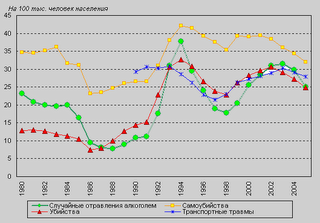
Causes of death per 100 thousand of population from 1980 till 2005.
Green – accidental alcohol poisoning
Red – homicides
Yellow – suicides
Blue – road accidents
"Entia non sunt multiplicanda praeter necessitatem." The universal methodological principle, known as Okkam's razor, says "Entities are not to be multiplied above the necessary." I try to use this principle to understand Russia - if there is a more simple way to explain something, then this way should be closer to truth than a more complex one.
It was during a walk through my American hometown with a friend from Moscow when I first felt the wide chasm separating the Russian and Western mentalities. During our suburban stroll, we came upon an old vacant house that had been up for sale for months. The owner had died and apparently there was nobody in the family to take care of the property. The lawn looked more like a wheat field, with crazy weeds and wild flowers sprouting up in strange places.
I was just about to explain why the property was such a mess when my Russian friend exclaimed, "You know, this is my favorite yard in the neighborhood."
I started to laugh until I realized that my friend was absolutely serious.
How strange, I thought. While the other houses boasted finely manicured lawns, with grass so perfect you could practice your golf putt, this uncultivated jungle - complete with mouse holes and a beehive - got the best reviews.
About a month later, the house was sold. No sooner had the moving vans departed then the landscapers pulled up to the curb. The lawn was de-weeded, sprayed with chemicals, and given a military-style crew cut. The diehard dandelions - the archenemy of every American gardener - had all been vaporized. The hedges were trimmed into perfect squares and rich black mulch was spread underneath them to give an accurate border at the grass line. To the dismay of my Russian friend, the verdant vegetation had been transformed into an immaculate American yard, complete with the Stars and Stripes fluttering from the freshly painted porch.
I will always remember my Russian friend's opinion of that overgrown lawn, which became for me a metaphor for Russia itself: On the surface, it may seem cluttered, disorganized, haphazard, and perhaps even a little bit dangerous. After all, even weeds are considered flowers in Russia, and in the summertime children wear tediously woven diadems of dandelions.
"Even if I do not believe in the divine order of things" exclaimed a Dostoevsky character, "the sticky young leaves emerging from their buds in the spring are dear to my heart; so is the blue sky and so are some human beings..."
My first impression of Russia was one of unbridled spontaneity, a soft anarchy of sorts, where rules and regulations seem to take a backseat (without a seatbelt) to the human spirit. This will come as a bit of a shock - if not a breath of fresh air - to many westerners.
The culture shock is immediately apparent on the wild drive from Sheremetyevo airport. The drivers all seem to have studied from different driving manuals and the only reason for the presence of the road police, as far as I could tell, is to pull over the foreign sports cars.
But even on Russian roads, there is an underlying order to the chaos that the western mentality can barely perceive. The drivers in Russia, for example, cut each other off with a brazen disregard that would explode into road rage on American highways. Russian drivers heed the maxim, "nature abhors a vacuum." In other words, if there is an opening, the Russian driver will fill it, be that on a sidewalk or wherever. Yet, fastening your seatbelt is considered an insult to the driver.
And then there are the notorious Russian queues, a phenomenon that deserves serious anthropological study.
In America, when you go to the doctor's office, for example, you take a number and have a seat in the waiting room. When your number is called, the doctor will see you. Pretty straightforward. In Russia, you walk into a riot, ask who is last, and tell that person to hold your spot and then go shopping or something. You return about an hour later and hop back into line like nothing happened. This drives Westerners nuts. Then (then!), while all this is happening, or not happening, people are attacking the gates from other directions, with all kind of plausible and not so plausible explanations.
Yet, in the midst of this chaos, it seems the Russians truly enjoy the lively debate, the human friction, the feeling of being on the edge of god knows what.
Across the Russian capital, the sound of lawnmowers and the smell of cut grass are becoming more common. Grass is sprouting up everywhere. A woman I know even replaced her lush garden at the dacha with grass seed.
Yes, the weed whacker of Western rationalization is slowly making headway against Russian impulsiveness; I just hope it does not supplant what makes Russia so unique.Another mysterious Putin’s joke nobody could decipher. A year ago when talking about Polish president Kwasnevki – who said, “
Dick Chaney came to
What do we learn from such verbal maneuvers? First, that
Second, we learn that
Third, we learn that
American political system was based on the ideas of the Age of Enlightenment. Two hundred years ago educated public sincerely believed that power corrupts but absolute power corrupts absolutely. So the system of check and balances was introduced. Nowadays